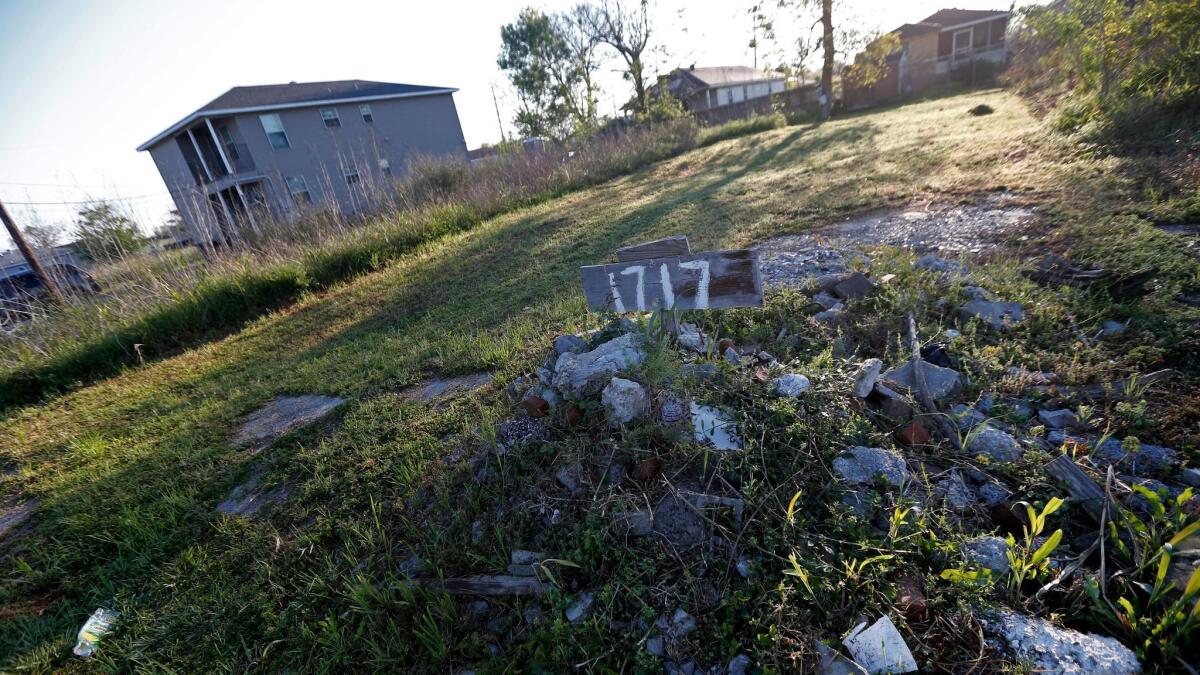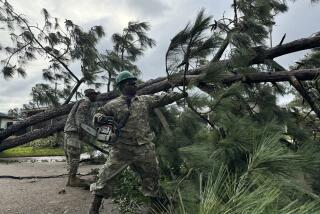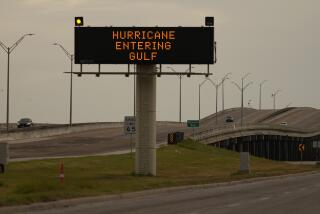Op-Ed: What Katrina taught me: A hurricane’s wounds can be treated but never healed

Every year I tell myself I’m over Hurricane Katrina, and every year I’m wrong. This year I got a double reminder that Katrina’s wounds can be treated but never healed. First, in early August, a “rain event” flooded numerous New Orleans neighborhoods. Parts of the city were inaccessible. Two African American landmarks that were destroyed by Katrina in 2005 and rebuilt, the Zulu Social Aid & Pleasure Club and the Circle Food Store, were once again swamped. Some of my friends lost cars and other possessions. Then, Hurricane Harvey.
The two storms — one unnamed and the other with a name now imprinted on Texan brains the way Katrina is on mine — reignited the disbelief, pain and anger I felt back in August 2005, feelings I’ve never completely let go of. It was surreal to watch so much of Texas go underwater. My family and I escaped to Houston after Katrina, so I recognized the random highway overpasses and frontage roads in the last week’s news reports.
Katrina didn’t take my life. But it took almost everything else. On Aug. 28, 2005, I had a good job, a fine house and a fast car. A week later, I had none of those. I come from a large family and all eight or 10 of our houses within New Orleans’ city limits were consumed by water. Katrina was a shock because it was a surprise. A few days before landfall, it was a Category 1 storm. In New Orleans, that’s an opportunity to take a day off work and spend time with your loved ones. Also, Katrina crossed the Florida peninsula, which usually acts like a buffer, turning potentially catastrophic weather into merely annoying weather. This time, Katrina regrouped over the warm waters of the Gulf of Mexico and grew exponentially at an incredible pace. Sound familiar?
Texas was good to my family. When we arrived in Houston, we had nothing but a couple of days’ worth of clothes, my new guitar, and insurance papers, which would prove worthless when the insurers argued all flood damage was excluded from coverage. We were tired, rancid and broke. But a relief agency gave us a charge card for emergency expenses. Someone directed us to an apartment to rent in the Woodlands. At a Walmart in Katy, a random woman offered to buy us whatever clothes we needed. We didn’t take her up on her offer, but the gesture made me feel like we weren’t alone. Like someone cared.
Hurricanes like Katrina and Harvey change you. In a fire, a home is lost. But in a catastrophic flood, a community is transformed.
Meanwhile, it was impossible to turn on the TV, radio or computer without seeing the devastation and breathless commentary about the devastation. A suburban mall’s parking lot was covered in water so that one of the big box department stores looked like a ship at sea. A voice on the radio wondered aloud if New Orleans would ever be habitable again. Someone online said we got what we deserved for tolerating Bourbon Street. And a major news network camera briefly panned toward a street sign near the corner of my house. High water lapped at the neck of the signpost. I didn’t know what condition anything of ours was in: family photos, our desktop computer, my wife’s wedding dress. My wish that the camera would swivel around for just a second didn’t come true.
But the media missed the main part of the story. Not long after the water began to recede, the reporters and networks moved on to other matters. Two major airlines filed for bankruptcy. George W. Bush nominated John G. Roberts Jr. to the United States Supreme Court. Gilligan from “Gilligan’s Island” died. The cameras weren’t watching as New Orleanians displaced as far away as Alaska and Hawaii made plans to come home. Some would return. Many thousands couldn’t afford to. We were lucky.
An arduous journey awaited us. A flooded home is a poisonous husk. It’s filled with mildew, mold and soured memories. We needed a place to stay while the repairs moved forward. But rent in the city skyrocketed to Park Avenue levels. Flood insurance rates also increased. Trustworthy and skilled contractors were in short supply. The market reacted by attracting countless con artists who accepted checks, performed perfunctory work and promptly disappeared. The grocery stores were closed. The churches were closed. The restaurants were closed. It was rare to see a functioning street light or hear a child playing in a yard. Even the insects had been killed off by toxic water.
But we persisted. Washington couldn’t tell us how to find a reputable contractor, but our friends and neighbors could. It wasn’t the president who convinced us that we could help bring our city back. It was phone calls with family members.
It would take seven months of constant work before we were able to move back into our house. And even then it was only partly inhabitable. No kitchen, no master bedroom, no full bath. The house wouldn’t be finished for nearly a year. We would never see half the neighbors on our block again. One neighbor came back, but didn’t finish his repairs until just after the 10-year anniversary of Katrina. But his tardiness was justified: He did the work all by himself.
While it’s true the nation pays attention when the media descend on New Orleans every August since 2005, no reporters saw us muck ruined family photos into garbage bags. They didn’t watch us haul our rotten refrigerator to the curb for collection. They weren’t there the first time we turned the lights back on.
Hurricanes like Katrina and Harvey change you. In a fire, a home is lost. But in a catastrophic flood, a community is transformed. The people you turn to in hard times — first responders, clergy, social workers — are suffering from the same psychic injuries as every other survivor. If you were touched by Hurricane Harvey, you will experience some form of mental health challenge: depression, anxiety, PTSD. The first time another storm threatens, you will wonder why you chose to live in Houston or Baytown or Rockport. You will wonder whether you should stay.
These are not questions with easy answers. Although there are solutions for the problems that cause flooding, they are costly and require enormous political will. Each person affected by Harvey will have to weigh whether to stand and fight or move to higher ground. As someone living below sea level for 40 years, I’m in no position to offer impartial advice.
Maurice Carlos Ruffin’s debut novel, “We Cast a Shadow,” is forthcoming from One World Random House in 2019.
Follow the Opinion section on Twitter @latimesopinionand Facebook
More to Read
A cure for the common opinion
Get thought-provoking perspectives with our weekly newsletter.
You may occasionally receive promotional content from the Los Angeles Times.










